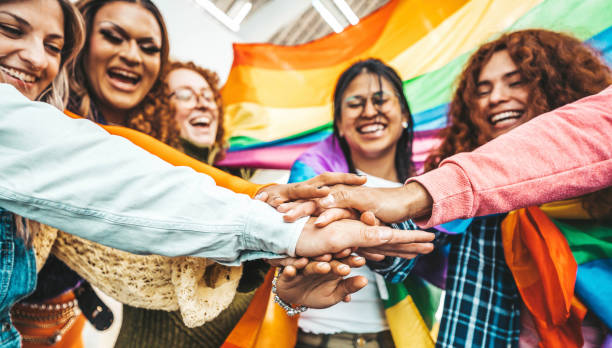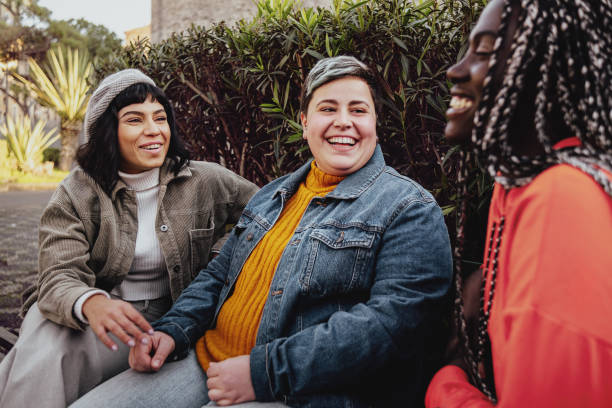
Being a member of the LGBTQ+ community can bring unique joys and challenges. While society has made significant strides in LGBTQ+ rights and acceptance, many individuals still face mental health issues related to their sexual orientation or gender identity, making it hard to navigate. Society at large still leaves room for debate about the rights of the LGBTQ+ community to equality. Access to medical care, family rights, spousal rights, and more all face routine legislative threats. This can be a dehumanizing and frightening atmosphere in general across the country. Depending on where you live, most people may or may not agree with your right to equality, safety, and protections under the law.
Beyond societal structures and shifts, LGBTQ+ folks still have personal lives to contend with. A lack of family support can be incredibly difficult to navigate. Living in a community that doesn’t have a prominent LGBTQ+ community can feel isolating; you might be the only LGBTQ+ member of your friend group, on your employment roster, at your volunteer organization. Even if you have LGBTQ+ friends and family with whom to connect, you still may feel the marginalization of being a minority and being misunderstood in some way.
What are the Mental Health Needs of the LGBTQ+ Community?
Mental health within the LGBTQ+ community deserves attention and support. Community members face and struggle with the following:
- Depression, anxiety, substance misuse
- Loneliness
- Discrimination, marginalization, oppression (experienced and/or witnessed)
- Financial insecurity
4 Ways to Navigate Mental Health as a Member of the LGBTQ+ Community
1) Build a Supportive Network:
Surrounding yourself with a supportive network of friends, family, or LGBTQ+ support groups can significantly impact your mental well-being. A support group is vital for navigating all aspects of life, and this is no different.

Keep your loved ones close to you and invite them to understand your lived experiences.
Connecting with individuals who understand your experiences, struggles, and triumphs can provide a sense of belonging, validation, and comfort. Fellow members of the LGBTQ+ community will be able to empathize with you when you experience unsettling incidents, whether you’re uncomfortable walking into a new space or being outright harassed. This is a kinship that can quickly develop a family-like bond; there is a well-established precedent in the LGBTQ+ community of “found family” for a reason.
Unfortunately, we sometimes realize that our loved ones don’t support the LGBTQ+ community and are making an exception for us. While this can feel touching and heartwarming, it can also create internal conflict. Don’t be afraid to set boundaries with your support group; if someone is rejecting a part of who you are, that may harm you. This doesn’t mean that we immediately write off the people we love for not being well-versed in LGBTQ+ rights and issues; it just means that we pay attention to how we feel when we are around our friends and family. If you get that instinct that you can’t truly be yourself, or that some topics are off-limits, or that your parent wouldn’t like you if you weren’t, you give yourself permission to process that. Have a plan in place for how you will cope with the emotions that arise and where your boundaries are about that. There is a lot of gray area between acceptance and dismissal and between remaining close and walking away. If your support group “supports” you, but you don’t really feel that it’s genuine or coming from a place that can sustain your relationship, you have the right to explore how you feel about that.
Part of building your support network involves knowing how you need to be supported. You may not know where to begin or have trouble getting specific when you really think about it. Having a mental wellness plan can assist you in determining what is best for you in all scenarios, support networks included. A mental health plan acknowledges what your needs are, determines how you will measure your health, and sets you up to enjoy the process as much as possible.
2) Cultivate Self-Care:

Practicing self-care is vital for maintaining mental well-being. The habit of showing yourself love and consideration fosters a mindset of self-worth. Even on our toughest mental health days, we can show ourselves kindness and support by providing ourselves with basic self-care, such as rest, hydration, nourishment, and hygiene. Some days that may look like ordering takeaway because we can’t find the energy to cook. It may look like doing a load of laundry but leaving the clothes in the dryer because we aren’t able to fold them and put them away. It may look like using baby wipes to feel clean if we can’t make ourselves shower. Taking supplements when our appetite is low to make sure we’re still getting some nutrients. Sometimes, self-care doesn’t sound all that fantastic. But what matters is that we do our best to care for ourselves in any way(s) we can.
Find activities that bring you joy, peace, and relaxation. These can be solo, partnered, or group activities; self-care doesn’t have to be “by oneself.” What is important is that you are designating time and space to do something that is purely for your happiness, wellness, and health. We spend a lot of time handling trauma, triggers, and setbacks. A self-care routine that includes activities that meet more than basic needs is a great way to balance all of the foundational self-care we have to do. Being a member of a marginalized group, you not only experience the stresses of the economy, the environment, and society but also those specifically attributed to your community. It may feel like going “above and beyond” for yourself to set aside time, resources, and space for “just a fun activity.” In actuality, you’re performing a vital, life-sustaining act of care for yourself. These activities may help you connect with others, unwind, explore your emotions, move your body, stay present, and experience many more beneficial outcomes.
Engage in hobbies, exercise, practice mindfulness or meditation, or seek therapy to process emotions and develop coping mechanisms. How do you know when your stress and anxiety are too high? What cues can you pick up on when it is time to stop, to process, to evaluate, and/or to make a change? Setting goals and parameters for your self-care will help you to look out for yourself. It can be an overwhelming undertaking, and some days will be easier than others. Reminding yourself to reach for not only what your basic needs are but what elevates your mood and mindset takes practice. Sometimes, you won’t be able to do it on your own. Other times, you will. The key is to make these strategies a habit, to make them familiar. Over time, they become a natural response to difficulties.
3) Seek Professional Help:
Mental health professionals who are LGBTQ+-affirming can provide specialized support and guidance tailored to your unique experiences. They can help you navigate the intersectionality of your identity and develop strategies to manage mental

health challenges effectively. A professional can be especially beneficial when your community at large goes through a tragedy. Yes, being in community and holding space for one another will be vital. But you may also want the room to experience your grief and fear without worrying about adding to someone else’s. When hate crimes happen, when discriminatory legislation occurs, when prominent LGBTQ+ leaders and organizers pass away, you deserve a safe place in which to process without censoring yourself.
Specific issues that you may face, such as discrimination, dysphoria, abuse, neglect, low self-worth, internalized homophobia, and more, deserve to be addressed in a safe and neutral environment. These are not the lived experiences of all people; it sometimes takes very specialized support to help you navigate what you’re going through. If you’ve never attended therapy before, you might not know what that could look like. You might have mixed feelings about getting professional help to deal with something perfectly natural, like your sexuality or gender identity. Seeking therapy for LGBTQ+ issues in no way implies that you think there is anything wrong with being the way you are. It is a tool that can be utilized to help you navigate a world that isn’t always kind to you.
As Woodland Hills anxiety therapists, our practice offers therapy for young adults, therapy for depression, and more. There are different therapeutic approaches that can be taken depending on individual needs. LGBTQ+ young adults may be navigating identities, having big conversations for the first time, trying to figure out where to go for support and a sense of belonging, and trying to build personal and professional relationships. It can be a lot to take on at once.
Our Mindfulness-Based Stress Reduction (MBSR), Dialectical Behavior Therapy (DBT), and Cognitive Behavioral Therapy (CBT) therapists in Woodland Hills all approach care for our patients from a mindful and accepting point of view. CBT therapy helps you to take charge of your thoughts, as your thoughts become actions, which become patterns. With these changes in thought also come changes in behavior. This can benefit LGBTQ+ folks by helping undo oppressive messaging built up over time. DBT combines cognitive therapy with mindfulness therapy to help you regulate your emotions during stressful situations and communicate your boundaries to keep you safe. MBSR will help you to take note of your emotional state in the present moment and observe it without judgment. This builds a pattern of acceptance that reduces anxiety; you focus more on your power in the present moment as opposed to living in the past or worrying about the future.
4) Utilize LGBTQ+ Resources:

LGBTQ+ organizations, helplines, and online platforms offer confidential support, resources, and information. These resources can help you find specialized mental health providers, access LGBTQ+-friendly therapy, and connect with others who share similar experiences. All the allyship in the world cannot replace being understood and related to or knowing who to ask about where to go or what to do in order to stay safe.
These resources exist in response to a sad need for them, but they don’t have to be depressing. Amidst the need for social nets and mental health support is a strong and loving community who have led social revolutions, championed human rights movements, come together to create awareness of issues of all sorts, created art that has lasted for generations, and so much more.
You may discover that there are resources in your neighborhood that make a difference in your daily life. These community resources may make you feel safer walking down the street and offer you connections to employment and volunteer opportunities that help you feed you literally or metaphorically. There may be in-person events to network; you might connect with people who want to go out and share experiences with you and/or people who are close enough to call if you feel unwell, unsafe, or unhappy. You can rely upon these people to understand and accept your challenges in a way that only those with lived experience can. When you call them up to say that you experienced something that drained all your energy, they will instantly know that you need extra care and support. The same will go for them when they need you.
Online, you have the opportunity to connect with anyone from anywhere, at any hour of the day or night. Online groups can provide messages of support, tips, and tricks for accessing affirming healthcare, suggestions of safe places to travel,

and friendships you might not have made otherwise. Mental health resources online can be there for you when you need them: if you can’t get a hold of someone else or don’t feel comfortable talking to someone else if you’re not sure who to turn to. They are in place because you are worthy of safety, protection, and support.
If you feel that your mental health is taxed by being a member of the LGBTQ+ community, you are not alone. You may find that your experiences are difficult and that you see the struggles of your loved ones and find those a heavy burden to carry as well. Let me be clear: what you need help navigating is not who you are. There is nothing wrong with who you are. Where you need support is in being who you are in a world that doesn’t understand, doesn’t respect, doesn’t support, and/or doesn’t protect who you are. Sometimes, no matter how much we love and accept ourselves, we get pushback. That can make our self-love feel confusing. It can create bitterness and frustration in the society we live in. These feelings, of being put down for who we intrinsically are, take a toll. You do not need mental health support because there is something “wrong” with you if you identify as LGBTQ+ – you need mental health support because there is something wrong with the way others behave toward you. Lean in on your self-care routine, your connections with loved ones and the LGBTQ+ community, and your mental health professional(s).
Anxiety Therapy at Embracing You Therapy
How has your mental health been lately? Do you feel like all you are trying to do is survive each day? Do you worry and ruminate often, causing you to disconnect from others?
When you seek Anxiety Therapy in Woodland Hills, CA, you will learn CBT and mindfulness techniques to better understand your emotions, identify and challenge your unhealthy thinking patterns, and learn new relationship skills to create more peace and calm in your life. Contact us today for your complimentary 20-minute phone consultation with our Client Care Coordinator.




